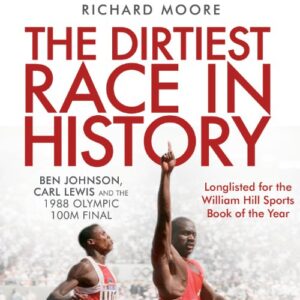Richard Moore’s “The Dirtiest Race in History” provides an intriguing and thought-provoking exploration of the infamous 1988 Seoul Olympics 100 meters final. This pivotal event continues to cast a long shadow over the world of athletics. Captivating not only sports fans but also those interested in the complex interplay of competition and ethics in high-pressure situations, Moore’s gripping narrative peels back the layers of the doping scandal, revealing a story far richer than the simplistic headlines of the past.
Central to Moore’s account is Ben Johnson, a sprinter often portrayed as the classic sports villain. Moore paints a more empathetic picture, tracing Johnson’s journey from a promising young athlete to his dramatic and public downfall during the Seoul Olympics. By exploring Johnson’s interactions with his coach, Charlie Francis, and detailing his intense rivalry with American sprinter Carl Lewis, Moore presents Johnson not simply as a wrongdoer but as a tragic figure shaped by the overwhelming pressures of competition and a widespread doping culture. This portrayal helps readers understand the complex forces influencing Johnson’s career and the broader athletic environment.
Beyond the main protagonists, Moore brings secondary characters vividly to life, enhancing the narrative’s depth. He provides insights into the roles of coaches and sports scientists, including an in-depth look at Charlie Francis. Moore discusses Francis’s controversial training methods and his approaches to performance enhancement, reflecting the era’s ethical ambiguities in sports. These details highlight the widespread nature of doping and the ethical dilemmas it poses.
Moore masterfully builds the story to a crescendo as he leads up to the Seoul Olympics. He skillfully intertwines personal histories, specific instances of technological advancements in doping, and the socio-political climate of the time. This build-up immerses readers in a high-stakes drama, where every second and every decision has significant implications. This crescendo not only captivates but also amplifies the fallout and the subsequent shockwaves through the sporting world.
The narrative raises provocative questions that engage readers deeply. Did the prevalent “win-at-all-costs” mentality in sports create an ecosystem ripe for ethical breaches? Is intense pressure to excel a valid excuse for making unethical choices? These questions challenge readers to contemplate the moral dimensions of not only sports but any competitive pursuit.
In conclusion, “The Dirtiest Race in History” is more than a recount of a sports scandal; it is a profound examination of the human elements in competitive environments. Moore provides valuable insights into integrity, the pressures of elite competition, and the crucial need for robust oversight, with lessons that resonate well beyond the track.
Key Takeaways:
- Integrity Over Victory: Upholding ethical standards is crucial, even under immense pressure to win, underscoring the importance of integrity in all competitive fields.
- Understanding Systemic Issues: Unethical behaviour often stems from broader systemic problems rather than just individual choices, highlighting the need for comprehensive solutions across organisations.
- The Need for Vigilance: Continuous oversight and transparency are essential to prevent corruption within competitive systems, whether in sports, business, or politics.
These insights underscore the relevance of Moore’s work as a reflection on the challenges and responsibilities faced in any competitive arena, providing profound insights applicable both inside and outside the sporting world.
